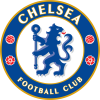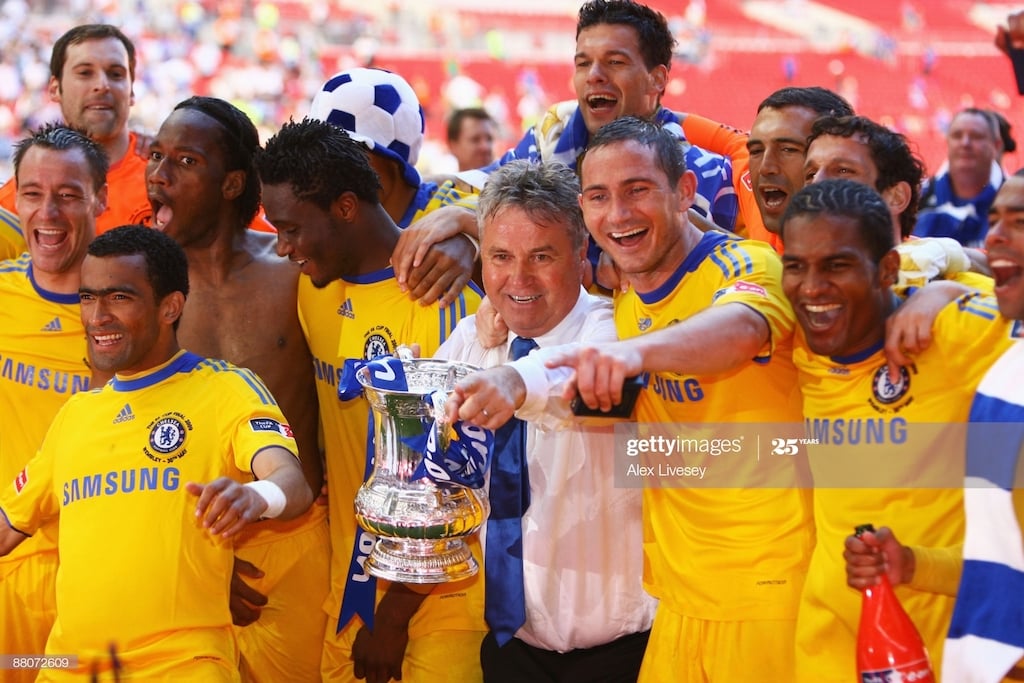It was Guus Hiddink’s day.
The vastly experienced manager, who had been brought in by Chelsea to replace Brazilian Luis Felipe Scolari during the 2008/09 season, had only been given 5 months to try and win his first English trophy.
Having won 11 trophies with Dutch Club PSV Eindhoven, including a European Cup, Hiddink was yet to win a major trophy outside of Holland.
He took over as manager in February 2009 with the club lying in fourth position in the Premier League, in danger of missing out on Champions League qualification for the first time since 2002.
What happened next would shape the club for many years to come.
-
Champions League Disappointment
Stability was the main reason why Hiddink was appointed.
Trying to ensure a top four finish was key, with the club knowing a new manager would be appointed on a full time basis once the season was done.
But Hiddink saw an opportunity for glory.
With results improving in the league, Hiddink turned his attention to winning a trophy, with the club in the last 16 of the Champions League and having an FA Cup quarter-final to look forward to.
In terms of the Champions League, the Blues were desperate for success having been the losing finalists the season before.
Knockout wins against Juventus and Liverpool followed to set up a semi-final against Barcelona.
Unfortunately, it wasn’t to be as Chelsea were knocked out in controversial fashion, which sparked investigations into the conduct of the second leg match referee.
With this disappointment, Chelsea and Hiddink’s last hope for a trophy was the Fa Cup.
-
The Road to the Final
Chelsea had seen off Southend United and Ipswich Town in the early rounds of the competition, before Scolari was sacked.
A Nicolas Anelka hat-trick helped the blues past Watford in the fifth round, under the guidance of caretaker manager Ray Wilkins.
Guus Hiddink’s first taste of the competition came in a quarter-final tie against Coventry City.
Goals from Alex and Didier Drogba saw Chelsea set up a Wembley date against Arsenal in the semi-finals.
The semi-final wasn’t as easy.
An early Theo Walcott goal threatened to derail the Blues.
But Florent Malouda put them back on track with a goal just before the half hour mark and when Didier Drogba (who else) scored an 84th minute winner, pandemonium ensued.
Onto the final.
-
Hiddink’s big day
The opponents were Everton, who were looking for their first piece of silverware for 14 years.
The 128th Fa Cup final saw the fastest final goal ever to be scored in the long history of the world’s oldest domestic football trophy.
However, it didn’t go Chelsea’s way.
Everton’s Louis Saha scored after just 25 seconds to put Chelsea in a position no one expected them to be so early on.
However, it wasn’t to be Everton’s day as Didier Drogba equalised in the 21st minute with a header before Frank Lampard scored a cracking goal to win it for Chelsea in the 71st minute.
The current Chelsea boss skilfully got past Phillip Neville before launching a left-footed shot from outside the area past Tim Howard.
Guus Hiddink lifted the most famous trophy in England just days before the curtains came down on his short spell at Stamford Bridge.
But he had brought the smiles back to a club who looked beaten before the Dutchman rejuvenated their season.
A major trophy and a third place finish in the league was enough for Chelsea to ask Hiddink to return in 2016 for another temporary stint.
The man will always have a special place in the heart of every Chelsea fan.










































